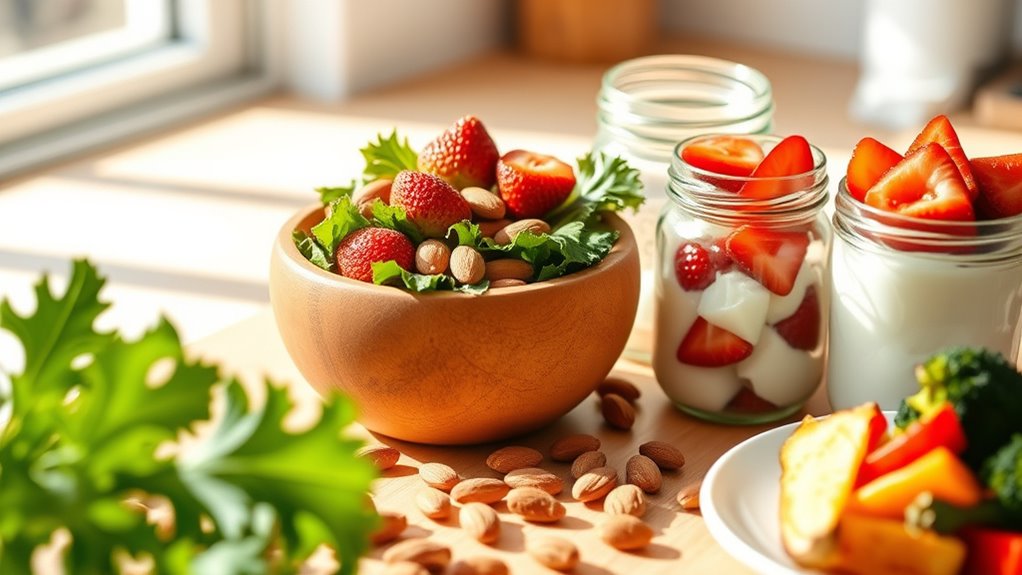To support bone health after 60, focus on foods rich in calcium like dairy products and leafy greens, and guarantee plenty of colorful vegetables for vitamins and minerals. Get enough sunlight or consume vitamin D-rich foods to boost calcium absorption. Include lean proteins and magnesium-rich nuts and seeds, while limiting excess sodium and caffeine that can weaken bones. Maintaining a healthy weight through exercise and diet is also key; explore more tips to keep your bones strong and healthy.
Key Takeaways
- Consume calcium-rich foods like dairy, leafy greens, and colorful vegetables daily to strengthen bones.
- Get sufficient vitamin D through sunlight exposure and foods like fatty fish to enhance calcium absorption.
- Include adequate protein, magnesium, and balanced minerals from lean meats, nuts, seeds, and plant-based sources.
- Limit sodium and caffeine intake to reduce calcium loss and prevent bone weakening.
- Support gut health with fermented foods and maintain a healthy lifestyle with weight-bearing exercises.
Prioritize Calcium-Rich Foods in Your Diet
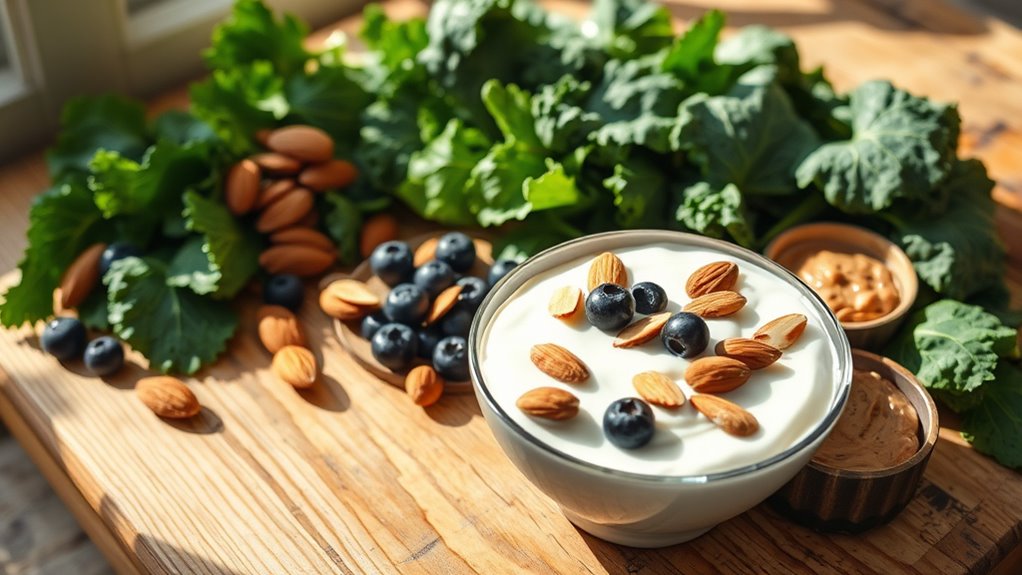
Since calcium is indispensable for maintaining strong bones, it’s important to include plenty of calcium-rich foods in your diet. Calcium plays a crucial role in preserving your bone density, helping to prevent osteoporosis as you age. Incorporate dairy products like milk, yogurt, and cheese, which are excellent sources of calcium. Leafy greens such as kale and broccoli also contribute to your intake. If you’re not getting enough calcium from food alone, calcium supplements can be a convenient option to ensure your bones stay strong. Regularly consuming calcium-rich foods and supplements, if needed, supports bone health and reduces fracture risk. Foraging behavior can influence the availability of nutritious foods, making it easier to maintain a balanced diet. Remember, a balanced approach helps maintain your bone density and overall strength well into your later years.
Incorporate Vitamin D for Better Calcium Absorption

Getting enough vitamin D is essential for your bones, as it helps your body absorb calcium more effectively. You can boost your levels by spending a bit of time in sunlight, eating vitamin D-rich foods, or considering supplements if needed. Ensuring adequate vitamin D supports stronger bones and reduces the risk of fractures. Incorporating calcium absorption strategies can further enhance bone health and prevent osteoporosis as you age.
Sunlight Exposure Boosts D
Exposure to sunlight is a simple yet effective way to boost your body’s production of vitamin D, which plays a crucial role in calcium absorption and maintaining bone density. Spending about 10-15 minutes outdoors a few times a week can considerably improve your vitamin D levels. This natural method helps your body produce D efficiently, supporting stronger bones as you age. Remember, factors like skin type and geographic location influence how much sunlight you need. To help you visualize, here’s a quick overview:
| Sunlight Exposure | Benefits for Bone Health |
|---|---|
| Short daily periods | Increase vitamin D levels naturally |
| Ideal timing | Supports calcium absorption |
| Skin type factors | Enhances bone density |
| Protective measures | Avoid sunburn while boosting D |
Additionally, understanding vitamin D synthesis can help tailor your exposure for optimal benefits. Integrating sunlight exposure into your routine can effectively support your bone health after 60.
Vitamin D-rich Foods Intake
Eating foods rich in vitamin D is an effective way to enhance your body’s ability to absorb calcium, which is essential for maintaining strong bones. Without enough vitamin D, your body struggles to utilize calcium supplements effectively, risking decreased bone density. To boost your vitamin D intake naturally, consider these options:
- Fatty fish like salmon, mackerel, and sardines provide high levels of vitamin D.
- Fortified foods such as milk, orange juice, and cereals help meet daily needs.
- Egg yolks offer a modest amount of vitamin D and are easy to include in meals.
- Staying informed about the latest advancements in AI technology can help you understand how innovations might impact health data management and privacy.
Supplements for Optimal Levels
Since natural sources of vitamin D may not always provide enough, supplementing can be an effective way to guarantee your levels stay ideal. Consider vitamin D supplements as part of your bone health routine, especially if your bone density testing indicates low levels. In addition to conventional methods, some turn to alternative medicine options, like herbal supplements, but always discuss these with your healthcare provider. Maintaining optimal vitamin D levels helps your body better absorb calcium, which is vital for strong bones. Regular bone density testing can help track your progress and guide your supplement choices. Additionally, choosing vetted supplements ensures safety and efficacy in supporting your bone health after 60. Remember, combining a balanced diet, appropriate supplementation, and medical advice ensures you’re taking the right steps to support your bone health after 60.
Emphasize Protein Intake for Bone Maintenance
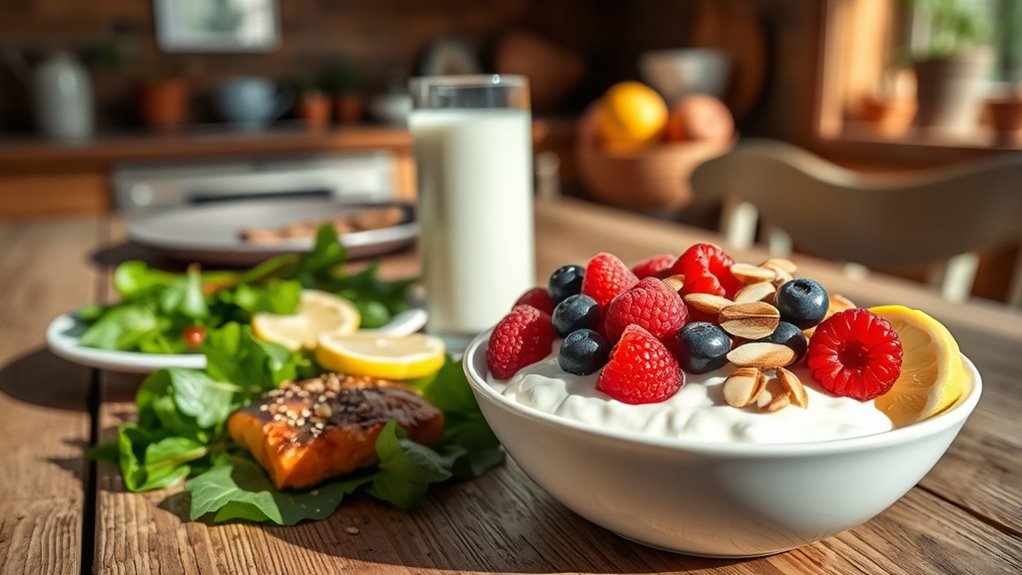
As you age, maintaining adequate protein intake becomes essential for preserving bone strength. Protein plays a key role in protein synthesis, which helps repair and build tissues, including bones. It also supports muscle support, vital for preventing falls and fractures. To maximize benefits, focus on:
- Incorporating lean meats, dairy, and plant-based proteins into your meals regularly.
- Spreading protein intake evenly throughout the day to enhance muscle support and bone maintenance.
- Pairing protein with vitamin D-rich foods to optimize calcium absorption and support overall bone health.
- Engaging in aquatic exercise, which provides low-impact resistance that can help strengthen muscles and bones.
Choose Magnesium and Phosphorus Sources Wisely
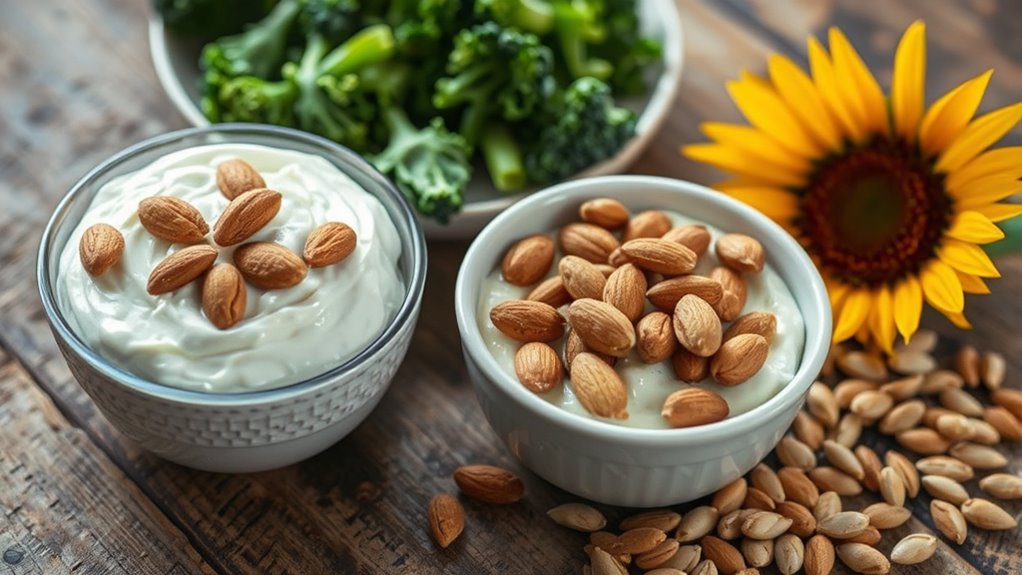
Choosing the right sources of magnesium and phosphorus can make a big difference in your bone health. Opt for foods like nuts, seeds, and leafy greens for magnesium, and be mindful of your phosphorus intake from processed foods. Balancing these minerals helps support strong bones as you age.
Smart Magnesium Choices
Opting for the right sources of magnesium and phosphorus can make a significant difference in supporting your bone health after 60. To maximize magnesium absorption, choose foods abundant in bioavailable magnesium like nuts, seeds, and leafy greens. When considering supplements, pay attention to timing; taking magnesium in the evening can improve absorption and promote relaxation. Here are three smart choices:
- Include magnesium-rich foods daily to naturally boost your levels.
- Opt for chelated magnesium supplements for better absorption.
- Take magnesium supplements with meals or before bed, depending on your needs, to enhance absorption and effectiveness.
Choosing wisely ensures your body gets the most benefit, helping to maintain strong bones as you age.
Phosphorus Intake Balance
Maintaining a proper balance between magnesium and phosphorus is essential for supporting your bone health after 60. When phosphorus levels are too high, they can disrupt calcium balance and hinder your body’s ability to keep bones strong. To promote healthy phosphorus regulation, choose foods that provide a balanced intake, like lean meats, dairy, and nuts. Be mindful to avoid excessive phosphorus from processed foods and soft drinks, which can throw off this delicate equilibrium. Adequate magnesium intake helps counteract the effects of high phosphorus and supports overall mineral harmony. Vetted – 1st Home Theatre Projector By selecting nutrient-rich sources of magnesium and managing your phosphorus intake wisely, you help maintain ideal calcium levels, strengthen bones, and reduce the risk of osteoporosis. Balance is key to keeping your bones healthy as you age.
Include Leafy Greens and Colorful Vegetables
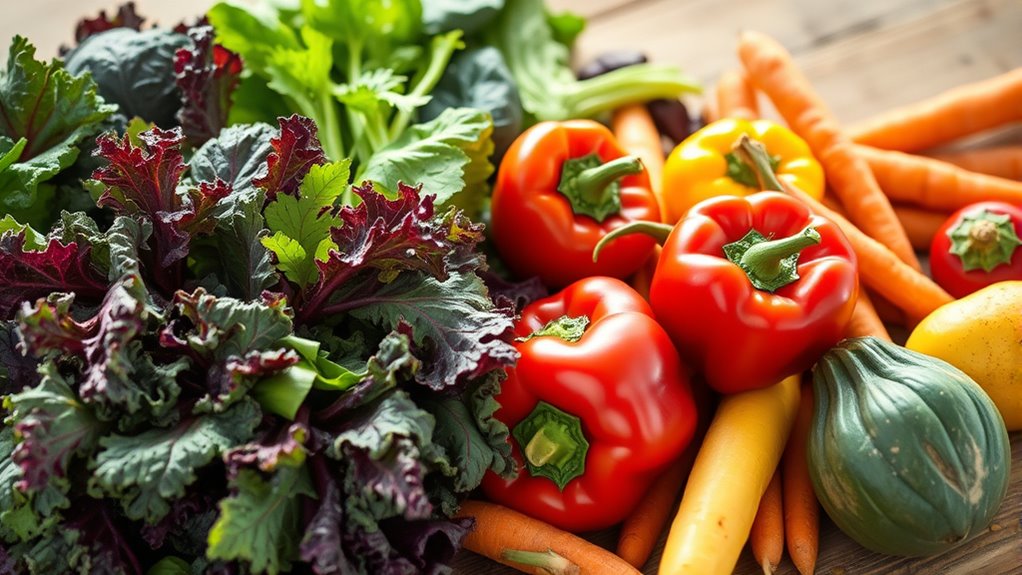
Including leafy greens and colorful vegetables in your diet is essential for supporting bone health after 60. These nutrient-rich foods provide calcium, magnesium, and antioxidants that strengthen bones and reduce inflammation. Incorporating a variety of vibrant vegetables ensures you get a broad spectrum of vitamins crucial for bone repair and maintenance. To enjoy these benefits, try these tips:
- Add spinach, kale, or Swiss chard to salads and smoothies.
- Incorporate bell peppers, carrots, and beets into stir-fries and snacks.
- Aim for a colorful plate by combining different vegetables daily for maximum nutrient intake.
- Consuming nutrient-dense foods can further enhance your bone health and overall well-being.
Limit Excessive Sodium and Caffeine Consumption
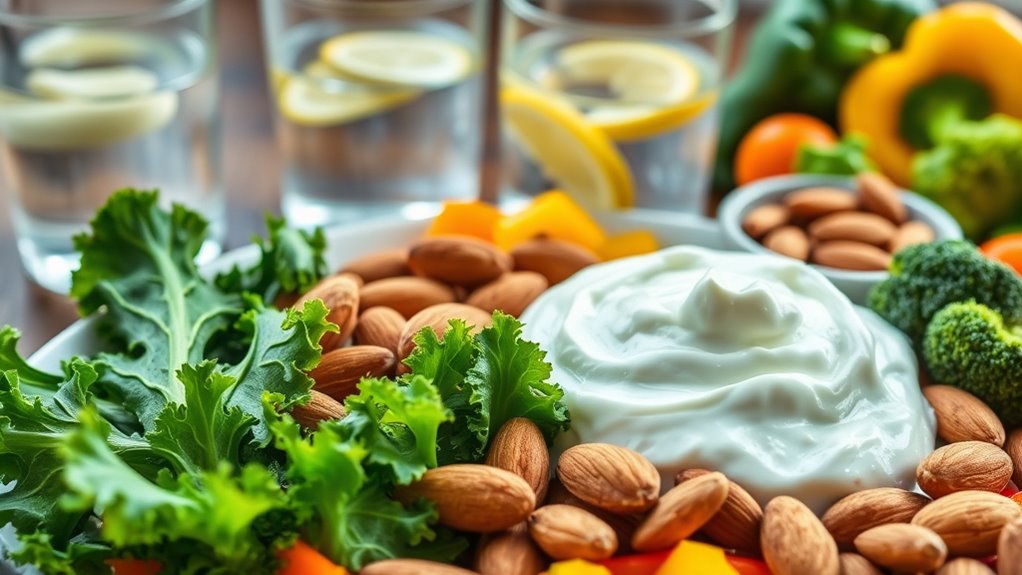
Excessive sodium and caffeine intake can undermine your bone health by increasing calcium loss through urine, which weakens bones over time. To support stronger bones, focus on sodium reduction by checking food labels and cooking with less salt. Limiting processed foods and fast foods also helps. Caffeine moderation is equally important; high caffeine intake can interfere with calcium absorption. Consider replacing coffee or tea with herbal teas or decaffeinated beverages. Staying within recommended limits helps your body retain essential calcium. Remember, small changes make a difference—cutting back on salt and caffeine promotes improved calcium balance and bone strength. Prioritizing these adjustments can help you maintain healthy bones as you age.
Add Bone-Boosting Nuts and Seeds
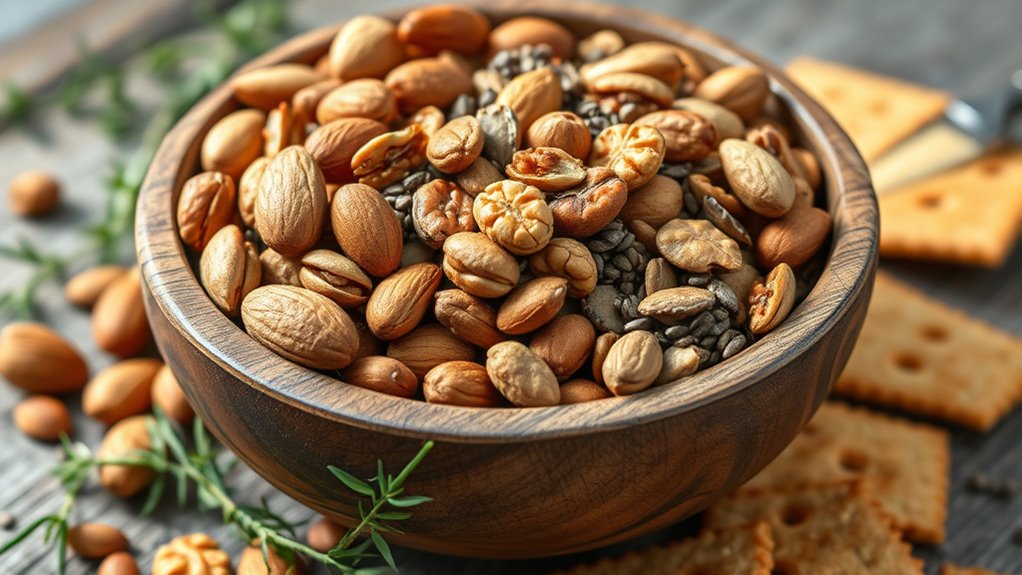
Adding bone-boosting nuts and seeds to your diet is a simple yet effective way to support your skeletal health. These nutrient-dense snacks provide essential minerals like magnesium, calcium, and phosphorus, which are crucial for maintaining strong bones. Incorporating plant-based sources into your meals can boost your nutrient intake naturally. Here are three tasty options:
- Almonds – rich in calcium and magnesium to strengthen bones.
- Chia seeds – packed with calcium, omega-3s, and fiber.
- Walnuts – contain healthy fats and magnesium that support bone density.
Enjoy these nuts and seeds as a quick snack, mixed into oatmeal, or added to salads. They’re convenient, versatile, and contribute considerably to your bone health after 60. Understanding bone health can help you make informed dietary choices.
Incorporate Fermented Foods for Gut and Bone Health
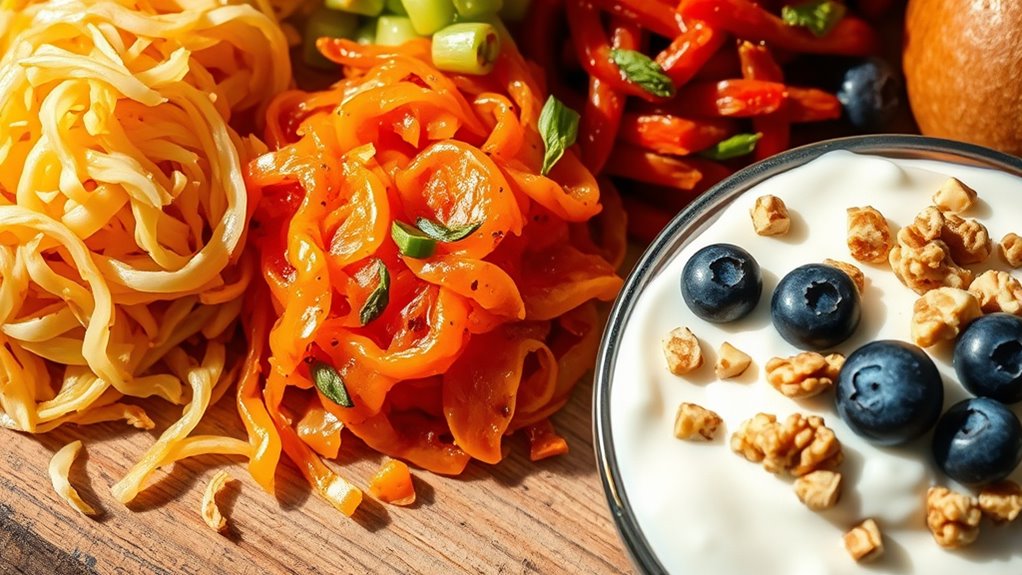
Including fermented foods in your diet can boost your gut health and support your bones. These foods are rich in probiotics, which improve digestion and help your body absorb essential nutrients. A healthy gut strengthens your bones, showing just how connected your digestive and skeletal systems truly are. Incorporating these foods into an email marketing tool integration strategy can further enhance your overall health messaging.
Probiotic Benefits for Bones
Since your gut health directly influences your bone strength, incorporating fermented foods rich in probiotics can be a smart move. Probiotic strains help balance gut flora, which plays a key role in nutrient absorption, including calcium and magnesium essential for bones. When your gut flora is healthy, it enhances your body’s ability to utilize these minerals effectively. To support bone health, consider these options:
- Include yogurt with live probiotic strains daily to boost gut bacteria.
- Add kefir to your smoothies for a probiotic-rich drink.
- Snack on fermented vegetables like sauerkraut or kimchi for variety and gut benefits.
Fermented Foods Riches
Fermented foods are a flavorful way to enhance both gut and bone health. Rich in fermented foods riches, they contain natural probiotics that support your digestive system, which is essential for absorbing nutrients like calcium and magnesium essential for strong bones. Incorporating yogurt, kefir, sauerkraut, kimchi, and miso into your diet can provide these probiotic benefits, helping to maintain a healthy gut environment. A balanced gut improves nutrient absorption, reducing inflammation that may weaken bones over time. Plus, fermented foods are versatile and easy to include in many meals. By regularly consuming these probiotic-rich options, you help support your bone health naturally while enjoying delicious flavors. Remember, a healthy gut is a key component of overall bone strength after 60.
Gut-Bone Connection
The health of your gut directly influences your bone strength, especially after 60. A diverse gut microbiome supports intestinal health, which in turn affects how your body absorbs calcium and other nutrients crucial for bones. Fermented foods help nurture this microbiome by introducing beneficial probiotics that improve gut balance. When your gut is healthy, nutrient absorption is optimized, reducing the risk of osteoporosis. To boost your gut-bone connection, consider:
- Incorporating fermented foods like yogurt, kefir, and sauerkraut into your diet regularly.
- Maintaining a diet rich in fiber to support good bacteria growth.
- Avoiding excess processed foods that can disrupt your gut microbiome.
Prioritizing gut health empowers your body to better support strong bones as you age.
Maintain a Healthy Weight to Reduce Bone Stress
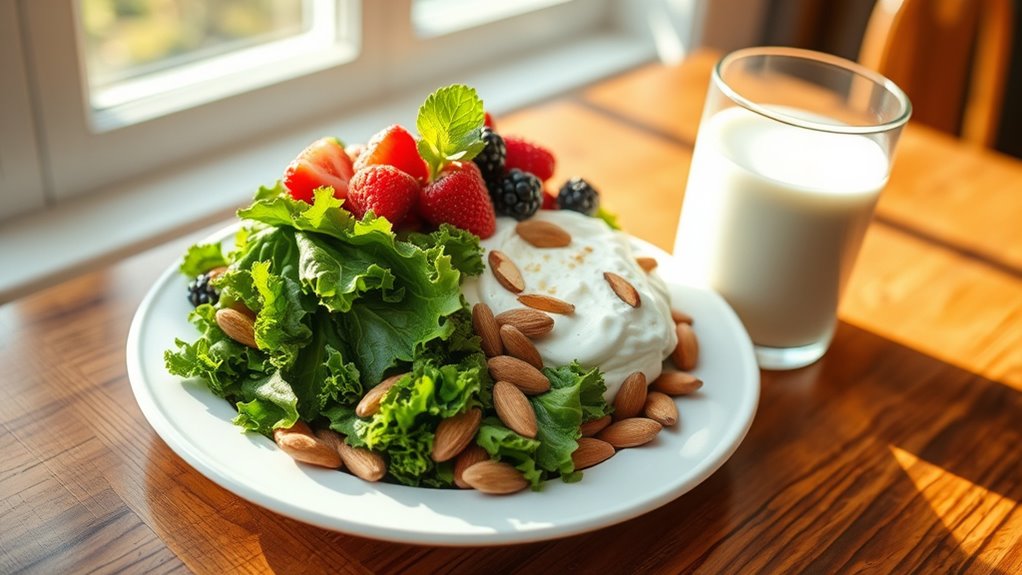
Maintaining a healthy weight is essential for reducing stress on your bones as you age. Excess weight puts extra pressure on your joints and bones, increasing the risk of fractures and osteoporosis. Incorporate regular exercise routines that include weight-bearing and strength-training activities to help manage your weight effectively. Staying active not only promotes bone density but also improves balance and coordination, which are crucial for fall prevention. Avoid carrying unnecessary weight and focus on a balanced diet to support weight management. Keeping a healthy weight reduces strain on your bones, making everyday movements easier and safer. By maintaining a healthy weight, you support overall bone health and lower your risk of falls and fractures, helping you stay active and independent longer.
Consider Supplements if Dietary Intake Is Insufficient
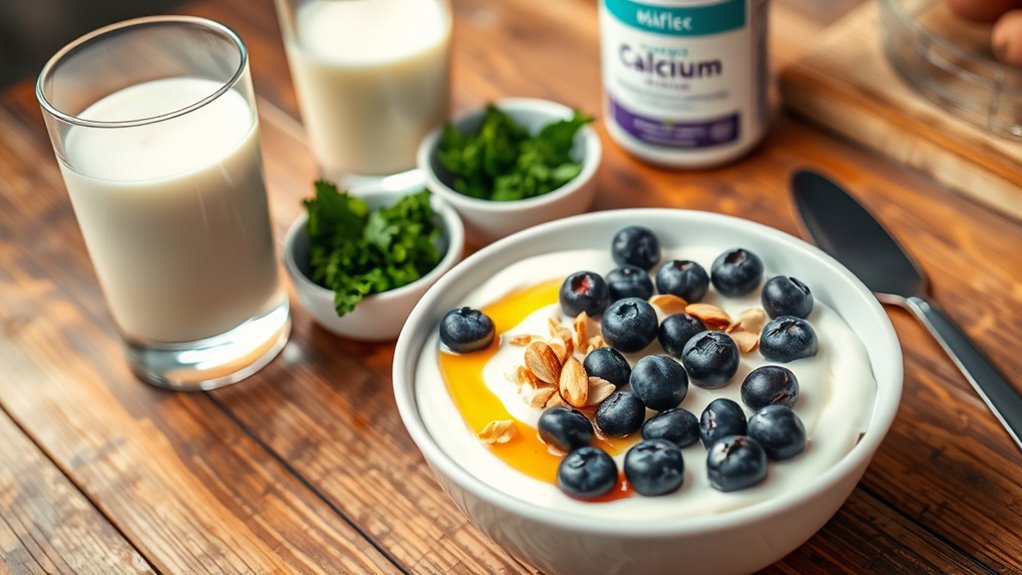
If your diet doesn’t provide enough key nutrients for bone health, contemplating supplements can be a helpful option. Sometimes, dietary gaps can be filled with targeted supplements, especially if you find it hard to get enough calcium, vitamin D, or magnesium from food alone. You might explore herbal supplements like horsetail or nettle, which are known for supporting bone strength. Visiting bone health clinics can help you get personalized advice and safe supplement recommendations. Here are three options to consider:
- Calcium and vitamin D supplements to strengthen bones
- Magnesium supplements to support mineralization
- Herbal supplements, such as horsetail and nettle, for additional support
Always consult healthcare professionals before starting new supplements to ensure safety and effectiveness.
Frequently Asked Questions
How Does Regular Exercise Complement Nutritional Strategies for Bone Health After 60?
Regular exercise, like weight-bearing activities and strength training, considerably boosts your bone health. These activities stimulate bone growth and increase density, complementing your nutritional efforts. When you combine proper nutrition with consistent exercise, you enhance calcium and vitamin D absorption, reducing osteoporosis risk. So, stay active regularly, incorporate weight-bearing and strength exercises, and support your bones effectively through this dynamic approach.
Can Alcohol Consumption Negatively Impact Bone Density in Older Adults?
Drinking habits can markedly impact your bones, as alcohol and osteoporosis are closely linked. Excessive alcohol consumption weakens your bones by interfering with calcium absorption and hormone production, increasing your risk of fractures. To protect your bone health, limit your alcohol intake and enjoy moderate drinking. This helps maintain better bone density and reduces the risk of osteoporosis, supporting your overall health as you age.
Are There Specific Foods to Avoid for Better Bone Health in Seniors?
You should avoid foods that can hinder your bone health, such as excessive salt, soda, and processed foods high in phosphates. These foods can leach calcium from your bones or reduce calcium absorption. Instead, focus on nutrient-rich options. Consider supplements like calcium and vitamin D, but always talk to your doctor first. Staying mindful of foods to avoid helps you maintain stronger bones as you age.
How Does Smoking Influence Bone Strength After 60?
Imagine your bones as a sturdy bridge, supporting your daily steps. Smoking hazards, however, act like corrosive rain, weakening that bridge over time. After 60, smoking accelerates bone weakening by reducing calcium absorption and harming bone cells. You can see the damage—fragile, brittle bones that increase your risk of fractures. Quitting smoking helps protect your bone strength, preserving your independence and keeping your foundation solid for years to come.
What Lifestyle Changes Can Further Support Bone Health Beyond Diet?
To further support your bone health, focus on managing stress and getting adequate sunlight exposure. Stress can weaken bones, so practice relaxation techniques like yoga or meditation. Aim for daily sunlight, which boosts vitamin D production essential for calcium absorption. Regular weight-bearing exercises also strengthen bones. Combining these lifestyle changes with a nutritious diet helps maintain bone density and reduces fracture risk as you age, keeping you healthier and more active.
Conclusion
By focusing on nutrient-rich foods like leafy greens, nuts, and fortified options, you can support your bones after 60. Did you know that nearly 1 in 3 women over 50 will experience osteoporotic fractures? Staying proactive with your diet not only strengthens your bones but also helps prevent fractures and boosts your confidence. Make small, consistent changes today—your future self will thank you for it.
